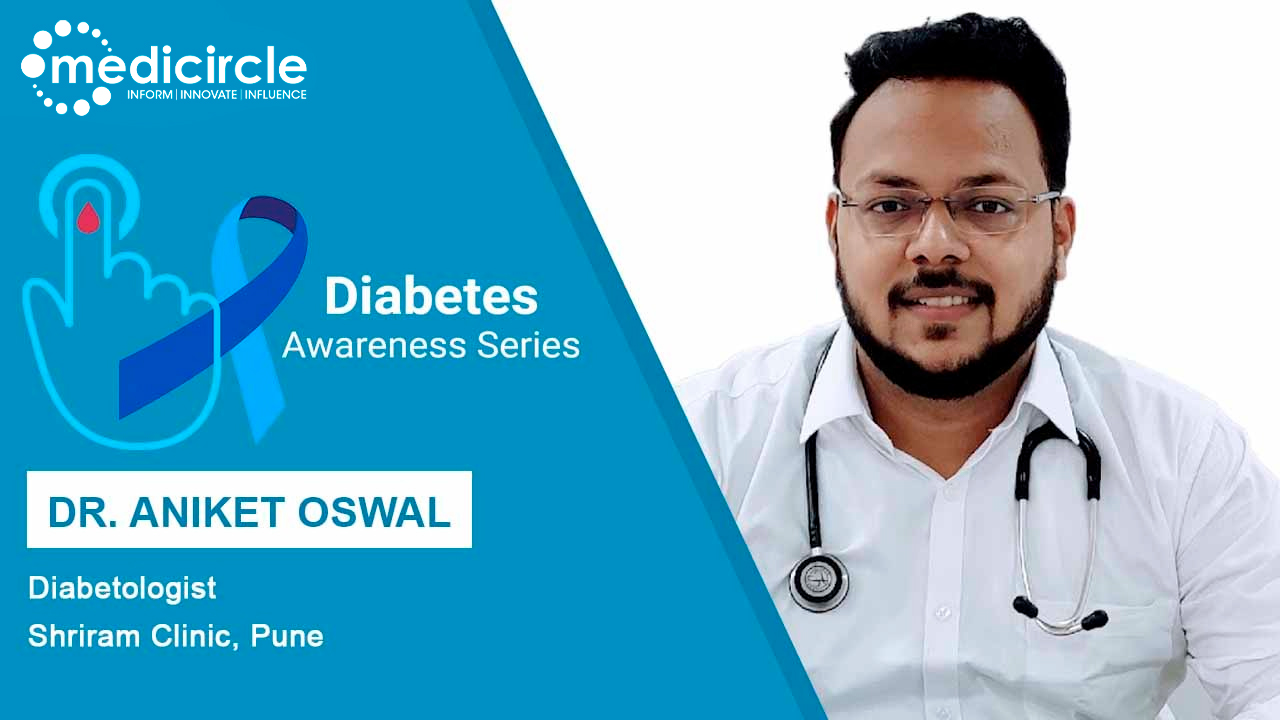We at Medicircle are constantly working on bringing to our audience all the trending health-related topics. It is our primary objective to bring to your attention news and views you need to be aware of to lead a healthy disease-free life. To help us in this regard we’d be joined by eminent and expert top doctors from across the country. Today in Doctor’s Speak we are going to talk about the problem of Diabetes and ways to help you deal with it.
Dr. Aniket Oswal is a Consultant Physician and Diabetologist in Swargate, Pune, and has an experience of 8 years in this field. He has done M.B.B.S from Government Medical College, Miraj in 2104 an M.D Medicine from Bharti Vidyapeeth College Pune and Masterclass in Diabetes Complications (U.K) and Postgraduate Program in Cardiology (U.S.A). He practices at Oswal Clinic and Shriram Clinic.
Diabetes diagnosis
Dr. Aniket says, “Diabetes is a group of metabolic diseases that causes high blood sugar. It occurs due to insufficient insulin production by the body or when the body is not able to use synthesized insulin effectively. The diagnosis of diabetes is done by performing blood tests
1. Blood sugar fasting (BSF)
2. Blood sugar postprandial (PP) – It is tested two hours after a meal.
3. Glycated haemoglobin (A1C test) – It tells average blood sugar levels for the past 3 months.”
Complications associated with diabetes
Dr. Aniket explains, “As it is a metabolic disease, it affects multiple organs of the body
Heart – Cardiovascular disease
Nerves – Neuropathy
Kidney – Nephropathy
Eyes – Retinopathy
Stroke – Paralysis
Uncontrolled diabetes can also lead to food infections, skin infections, and diseases"
Diabetes - Types
Dr. Aniket expresses, “Diabetes can be divided into 4 types
1. Type 1 Diabetes – Beta cells of the pancreas are destroyed thus there is no insulin production by the pancreas. Therefore, in the absence of insulin, blood sugar level rises.
2. Type 2 Diabetes – In this, the body has insulin but it becomes resistant to insulin and further causes an increase in blood sugar levels.
3. Gestational diabetes – High blood sugar during pregnancy is called gestational diabetes. If this is left untreated, it can get converted into type 2 diabetes.
4. Other causes – Consumption of certain drugs can lead to high blood sugar levels. As soon as these medicines are stopped, blood sugar returns to normal. Sometimes pancreatic carcinoma and other health issues may also lead to diabetes.”
Diabetes management
Dr. Aniket illustrates some tips to manage diabetes effectively for a healthier life.
1. Restrict carbohydrate intake – A high amount of carbohydrates in food corresponds to high blood sugar levels. Diabetes patients should limit the consumption of carbohydrates.
2. Medical nutrition therapy – With a proper diet as suggested by your doctor, diabetes can be very well managed.
3. Medicines – Oral tablets, injectables
4. Yoga and exercise – It improves body metabolic rate which further increases insulin secretion. Once insulin gets regularised, sugar levels return to normal.
5. Blood glucose monitoring – Patients should monitor their blood glucose levels regularly to avoid any severe complications.
6. Weight loss – It is very effective in controlling sugar levels.
(Edited by Renu Gupta)

 Know some significant tips to manage diabetes effectively for a healthier life from experienced Dr. Aniket Oswal.
Know some significant tips to manage diabetes effectively for a healthier life from experienced Dr. Aniket Oswal.

































